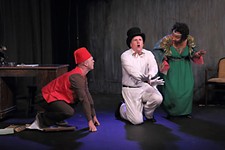Luminarias
Local Arts Reviews
Reviewed by Robert Faires, Fri., Feb. 22, 2002

Luminarias: True Hearts
State Theater,through February 23
Running Time: 2 hrs
We hold these truths to be self-evident: that all men are assholes; that all Latino men are macho assholes (but man, can they love!); that Korean men can't dance; that white guys not only can't jump, they also can't get it up (though admittedly it's hard to tell since their equipment is so small); and that white women just want to steal Latino men from the Latinas who love them.
So proclaim various characters in Evelina Fernandez's play Luminarias and with the certitude of people who know whereof they speak. In the case of Andrea, the lawyer whose Latino husband of many years has just left her for a blond Anglo attorney, or Cindy, the young client of Andrea's whose husband beats her, experience would seem to back up their beliefs. But sometimes, as with Irene, the Latina who pledged to the Virgen to give up sex for a year and who really doesn't have that much, um, first-hand experience with Anglo appliances, there's nothing supporting their views but old wives' tales and slumber party gossip. Still, no matter where these characters came by their beliefs, they hold to them with the unshakeable conviction of religious adherents -- that is, until someone comes along and puts the lie to their truths.
In many ways, Luminarias is about taking the unfair expectations we have and turning them on their heads. Character after character is forced to confront the prejudices they carry toward others. Andrea, who is sure all Anglos are patronizing and manipulative, falls in love with a white man. That man, who automatically assumes any young man with brown skin is a thief or gang-banger, finds that some also happen to be good Samaritans and Ph.D. candidates. Andrea's friend Sofia, who has spurned the men of her own race in favor of successful Anglos, falls for a Mexican, and a waiter, no less. Another friend, Lilly, whose love life has been a parade of Latino losers who left her in the lurch, finds her truest love yet in an Asian man -- one who can dance. Don't assume you know everything there is to know about those who are different from you, the play cautions; you may find more to them than you think if you just give them half a chance.
The same holds true for this Teatro Humanidad production. If you think all Latino theatre is set in the barrio, with a good boy from a good familia going bad, being sucked into the gang life and/or screwed by the Man, then this show will set you straight. Oh, there's a trip to the barrio here (featuring some hysterical comedy by Diana Torres and Erica Saenz as a couple of randy old tias), and some melodrama, too, but there's also humor and heartache and some complicated struggles regarding gender politics and cultural bigotry and religion and broken homes, and it all centers on a quartet of intelligent, independent, successful, sexy, bawdy, flawed, funny, complex Latinas.
And their story is told with the style and flair of a pop concert. Leilah Stewart's set consists of sleek modular furniture that rolls smoothly among the tall, translucent columns lit from within, creating varied locales. As scenes shift, Philip Montoya's sound design throbs with dance beats and lush vocals, and Mark Novick's twirling club lights spray dots of colored illumination across the stage and audience. Director Rick Garcia moves the story along briskly, taking his cue from the cinema in terms of pace and perspective, yet staging it with an eye to theatricality, as when he allows Andrea's friends Lilly, Sofia, and Irene to change costumes onstage or watch the action in scenes they aren't in, or when he stages a bedroom scene as if from above, with the lovers standing behind a bedspread held up by two actors. This is Latino theatre -- Latina theatre -- that's modern, urban, hip.
Ultimately, though, it's less about the feel than the characters, and what Fernandez and this production give us here are individuals, distinct personalities who draw us into their lives with the feelings and thoughts they express. It may be Alma Chapa Moore's Andrea, staring across a bar at her straying husband, an ache of betrayal and yearning in her gaze, or Erica Saenz's Sofia, strikingly self-possessed until a certain someone delivers drinks to her table and she melts, or Karinna Perez's Cindy, indignantly railing at her abusive spouse, or Diana Torres' sweetly tenderhearted Lilly or Carra Martinez's sassy, sultry Irene, but they open to us individual hearts, reveal singular lights that burn within these women. If you want truths, that's where you'll find them. Truly.










